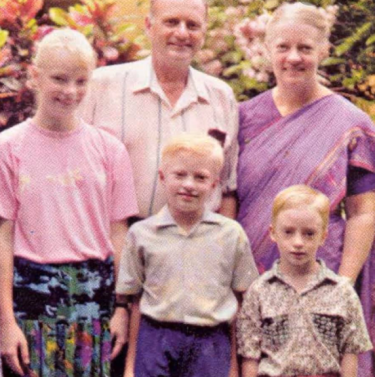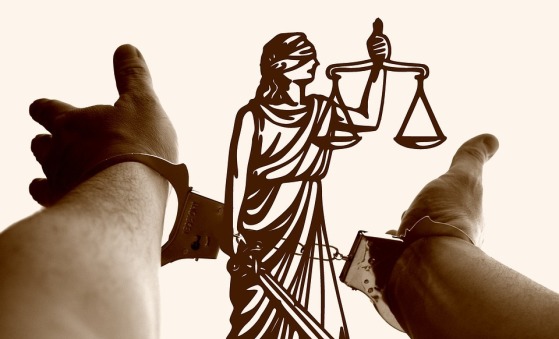
It was a frigid night on January 22, 1999, in the remote village of Manoharpur, Odisha. As the world slept, a tragedy unfolded that would haunt India’s conscience forever. Graham Staines, a missionary who had spent over three decades serving leprosy patients, lay asleep in his van alongside his two young sons, Philip, 10, and Timothy, 6. They were attending a jungle camp—a retreat for prayer and service—but that night, meant for reflection and faith, would end in unspeakable horror.
A mob, shouting chants of “Jai Shri Ram,” surrounded their vehicle. The cries pierced the night, carrying with them an ominous threat. Within moments, the mob set the van ablaze, trapping Staines and his sons inside. The flames consumed the vehicle as the three huddled together in a desperate bid for survival. Their anguished cries were drowned out by the triumphant chants of their attackers. When the fire subsided, the charred remains of the father and his sons bore silent testimony to a night of unimaginable cruelty.
The brutal killing of Graham Staines and his children shocked the world. How could a man who had dedicated his life to selfless service meet such a fate? How could innocent children be victims of blind hatred? The tragedy became a symbol of a growing intolerance, fueled by an ideological fervor that has reshaped India’s social and political landscape.
The Rise of Hindutva and the Politics of Division
The Staines tragedy was not an isolated incident but part of a broader pattern of hostility toward minority communities, particularly Christians, in India. Over the years, Hindutva—a political ideology seeking to establish a Hindu-centric national identity—has systematically marginalized communities of other faiths, including Christians and Muslims. Under this framework, Indian identity is narrowly defined through the lens of Hindu religion and culture, fostering an “us versus them” narrative.
Christians, in particular, are often portrayed as agents of foreign influence, accused of undermining India’s cultural heritage through conversions. This rhetoric has fueled suspicion, hostility, and ultimately violence. The killing of Graham Staines and his sons marked one of the darkest manifestations of this ideology, but it was far from the last.
Legislative Oppression: Anti-Conversion Laws
One of the tools employed to marginalize Christians is the so-called “freedom of religion” bills, which ostensibly aim to prevent forced conversions but, in practice, suppress religious freedom. These laws require individuals seeking to convert to another faith to obtain government approval, turning personal spiritual choice into a bureaucratic hurdle. Christian pastors and missionaries often face baseless accusations of coercion, leading to harassment, arrests, and mob violence.
Routine religious gatherings—prayer meetings, baptisms, and other expressions of faith—are frequently disrupted under the guise of investigating “forced conversions.” These laws have emboldened vigilante groups, allowing them to raid Christian events and attack worshippers with impunity. Far from protecting religious freedom, these laws institutionalize discrimination and foster an environment of fear.
Manipur: A Case Study in Christian Persecution
The violence in Manipur offers a chilling example of this systemic persecution. What began as ethnic tensions escalated into targeted attacks against the Christian Kuki-Zo community. Churches were burned, homes destroyed, and individuals attacked, often with the tacit support of authorities aligned with Hindutva ideology. The violence in Manipur underscores the pervasive impact of the culture of contempt, where Christians are treated as outsiders in their own land. This marginalization is reinforced by a narrative that frames Christian identity as un-Indian, incompatible with the nation’s heritage. Such rhetoric not only justifies violence but also normalizes the systemic exclusion of Christians from public life. Anti-conversion laws and vigilante attacks are just symptoms of a deeper problem: the erosion of India’s pluralistic traditions in favor of a homogenized, exclusionary vision of nationhood.
Undermining Democratic Institutions
The culture of contempt fostered by Hindutva politics poses a grave threat to India’s democratic framework. Secularism, enshrined in the Indian Constitution, is being undermined as religious identity becomes a battleground for political dominance. This polarization erodes trust in institutions meant to safeguard justice and equality. Police inaction during attacks on Christians, coupled with a lack of accountability for perpetrators, highlights the complicity of state machinery in perpetuating this cycle of violence.
Even the judiciary has faced criticism for its reluctance to hold perpetrators accountable, contributing to a culture of impunity. As a result, democratic institutions are increasingly seen as instruments serving majoritarian interests rather than protecting the rights of all citizens.
Systemic Inequality and Marginalization
The persecution of Christians is not only a religious issue but also a socio-economic one. Many Christians in India belong to marginalized communities, including Dalits and tribals, who face intersectional discrimination. Hindutva ideology exploits these existing hierarchies, using Christians as scapegoats to divert attention from systemic issues such as poverty, unemployment, and inadequate public services.
By targeting Christians, Hindutva proponents reinforce systemic inequality, ensuring that marginalized groups remain on the fringes of society. Educational and economic opportunities are often denied to Christians, further entrenching their marginalization. Legislative measures like anti-conversion laws institutionalize this exclusion, creating an environment where religious freedom is a privilege rather than a right.
Charting a Path Forward
To counter the culture of contempt, both structural reforms and grassroots resistance are essential. India must recommit to its secular and pluralistic foundations by enforcing constitutional protections for religious freedom and holding perpetrators of religious violence accountable. Discriminatory legislation, such as anti-conversion laws, must be repealed to ensure equality for all citizens.
At the grassroots level, fostering interfaith dialogue and promoting India’s diverse heritage can help bridge divides. Education initiatives that challenge stereotypes and empower marginalized communities are vital for building an inclusive society. International pressure can also play a role in holding the Indian government accountable for human rights violations, ensuring that minority communities are protected.
A Call for Unity and Justice
The culture of contempt threatens to erode the soul of India, a nation historically celebrated for its diversity and pluralism. The tragedy of Graham Staines and his sons, the violence in Manipur, and the systemic marginalization of Christians serve as stark reminders of the urgent need for resistance and reform. As Dr. B.R. Ambedkar once said, “Democracy is not merely a form of government. It is primarily a mode of associated living, of conjoint communicated experience.” Reclaiming this spirit of unity and coexistence is essential to preserving India’s democratic and pluralistic ideals.
Rev. Dr. Richard Howell is the Principal of Caleb Institute, Haryana, India. He is the former General Secretary of Evangelical Fellowship of India and Asia Evangelical Alliance. He is also the founding member of the Global Christian Forum.




